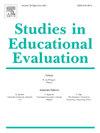超越基本技能:对成绩较差的五年级学生基本概念理解的有效基础干预
IF 2.6
2区 教育学
Q1 EDUCATION & EDUCATIONAL RESEARCH
引用次数: 0
摘要
成绩差的学生需要有针对性的干预,以弥补成功进一步学习所需的关键基础知识。对于五年级,关键的基本概念(例如,对数位的理解和乘法的含义)和基本技能(例如,步数和乘法事实)被确定为同等重要且高度交织的。然而,基础干预项目有效性的证据主要是针对基本技能和幼儿对基本概念的理解提供的,但尚未为五年级学生对基本概念的理解提供充分的证据。在本文中,我们提出了一项准实验实施试验(n = 295),旨在促进对算术基本概念的理解的掌握数学基础干预计划的有效性。干预组的教师接受了专业发展课程的培训,并得到了详细的形成性评估和教材的支持,以促进成绩差的学生在常规数学课堂的补充小组干预中理解。控制班的老师收到了学生成绩的评估反馈,以及在基本技能和基本概念方面的建议,但他们的常规数学课堂没有专业发展或教材。通过重复测量的方差分析,将性别、社会经济地位、移民背景和阅读能力作为协变量,将干预组与对照组(通过倾向评分匹配选择)进行比较。干预组在明确涵盖的基本概念上明显优于对照组。基本技能未发现迁移效应。进一步的分析表明,干预组比他们成绩更好的同学学得更多。最有趣的是一个积极的溢出效应,所有的学生在精通数学学校学习到的低年级内容的基本概念明显更多,所以教师在小组基础干预中的专业经验似乎也扩散到他们的常规课堂。结果表明,当教师在培养对基本概念的理解方面获得额外的专业知识时,以理解基本概念为目标的以概念为重点的基础干预计划可以有效地实施,甚至可以对那些没有参加小组干预的学生的学习产生影响。本文章由计算机程序翻译,如有差异,请以英文原文为准。
Beyond basic skills: An effective foundation intervention for low-achieving fifth graders’ understanding of basic concepts
Low-achieving students need targeted interventions to remediate the critical foundational knowledge required for successful further learning trajectories. For Grade 5, critical basic concepts (e.g., place-value understanding and meaning of multiplication) and basic skills (e.g., counting in steps and multiplication facts) have been identified as equally important and highly intertwined. However, evidence for the effectiveness of foundation intervention programs has mainly been provided for basic skills and for younger children’s understanding of basic concepts but has not yet been sufficiently provided for fifth graders’ understanding of basic concepts. In this paper, we present a quasi-experimental implementation trial (n = 295) on the effectiveness of the Mastering Math foundation intervention program that aims at fostering understanding of basic concepts in arithmetic. Teachers in the intervention group were prepared in professional development courses and supported by detailed formative assessment and teaching materials to foster low-achieving students’ understanding in small-group interventions supplemental to the regular mathematics classrooms. Teachers in the control classes received assessment feedback on students’ achievement and the suggestion to work on basic skills and basic concepts, but no professional development or teaching materials for their regular mathematics classrooms. The intervention group was compared to a control group (selected by propensity score matching) by analyses of variances with repeated measures, applying gender, socioeconomic status, immigrant background, and reading proficiency as co-variates. The intervention group significantly outperformed the control group in the explicitly covered basic concepts. No transfer effect was found for basic skills. Further analyses showed that the intervention group learned significantly more than their higher-achieving classmates. Most interesting was a positive spillover effect that all students in the Mastering Math schools learned significantly more basic concepts of below-grade content, so the teachers’ professional experiences in the small-group foundation intervention seem to also have diffused into their regular classrooms. The results show that, when teachers gain additional expertise on fostering understanding of basic concepts, conceptually focused foundation intervention programs targeting understanding of basic concepts can be effectively implemented and can even have an impact on the learning of those students who did not attend the small-group intervention.
求助全文
通过发布文献求助,成功后即可免费获取论文全文。
去求助
来源期刊

Studies in Educational Evaluation
Multiple-
CiteScore
6.90
自引率
6.50%
发文量
90
审稿时长
62 days
期刊介绍:
Studies in Educational Evaluation publishes original reports of evaluation studies. Four types of articles are published by the journal: (a) Empirical evaluation studies representing evaluation practice in educational systems around the world; (b) Theoretical reflections and empirical studies related to issues involved in the evaluation of educational programs, educational institutions, educational personnel and student assessment; (c) Articles summarizing the state-of-the-art concerning specific topics in evaluation in general or in a particular country or group of countries; (d) Book reviews and brief abstracts of evaluation studies.
 求助内容:
求助内容: 应助结果提醒方式:
应助结果提醒方式:


